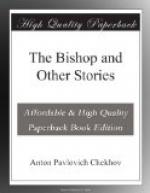Father Anastasy laughed huskily, cleared his throat and waved his fingers in the air as though preparing to say something. His Reverence glanced at him and said sternly:
“Don’t interfere, Father Anastasy.”
The old man laughed, beamed, and evidently listened with pleasure to the deacon as though he were glad there were other sinful persons in this world besides himself. The deacon spoke sincerely, with an aching heart, and tears actually came into his eyes. Father Fyodor felt sorry for him.
“You are to blame, deacon, you are to blame,” he said, but not so sternly and heatedly as before. “If you could beget him, you ought to know how to instruct him. You ought to have trained him in his childhood; it’s no good trying to correct a student.”
A silence followed; the deacon clasped his hands and said with a sigh:
“But you know I shall have to answer for him!”
“To be sure you will!”
After a brief silence his Reverence yawned and sighed at the same moment and asked:
“Who is reading the ’Acts’?”
“Yevstrat. Yevstrat always reads them.”
The deacon got up and, looking imploringly at his Reverence, asked:
“Father Fyodor, what am I to do now?”
“Do as you please; you are his father, not I. You ought to know best.”
“I don’t know anything, Father Fyodor! Tell me what to do, for goodness’ sake! Would you believe it, I am sick at heart! I can’t sleep now, nor keep quiet, and the holiday will be no holiday to me. Tell me what to do, Father Fyodor!”
“Write him a letter.”
“What am I to write to him?”
“Write that he mustn’t go on like that. Write shortly, but sternly and circumstantially, without softening or smoothing away his guilt. It is your parental duty; if you write, you will have done your duty and will be at peace.”
“That’s true. But what am I to write to him, to what effect? If I write to him, he will answer, ‘Why? what for? Why is it a sin?’”
Father Anastasy laughed hoarsely again, and brandished his fingers.
“Why? what for? why is it a sin?” he began shrilly. “I was once confessing a gentleman, and I told him that excessive confidence in the Divine Mercy is a sin; and he asked, ‘Why?’ I tried to answer him, but——” Anastasy slapped himself on the forehead. “I had nothing here. He-he-he-he! . . .”
Anastasy’s words, his hoarse jangling laugh at what was not laughable, had an unpleasant effect on his Reverence and on the deacon. The former was on the point of saying, “Don’t interfere” again, but he did not say it, he only frowned.
“I can’t write to him,” sighed the deacon.
“If you can’t, who can?”
“Father Fyodor!” said the deacon, putting his head on one side and pressing his hand to his heart. “I am an uneducated slow-witted man, while the Lord has vouchsafed you judgment and wisdom. You know everything and understand everything. You can master anything, while I don’t know how to put my words together sensibly. Be generous. Instruct me how to write the letter. Teach me what to say and how to say it. . . .”




